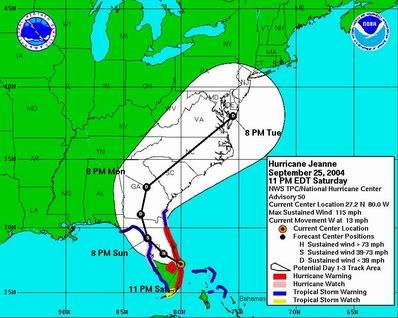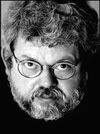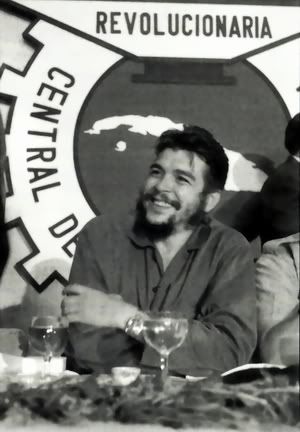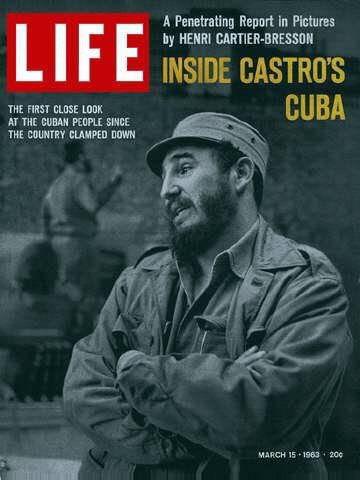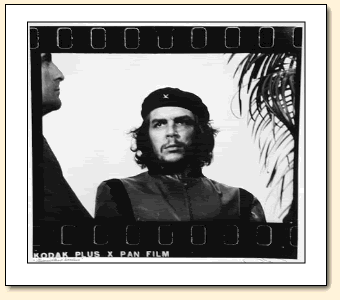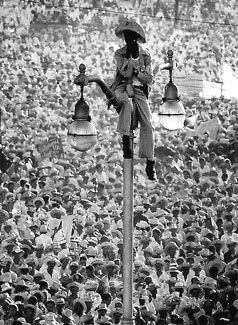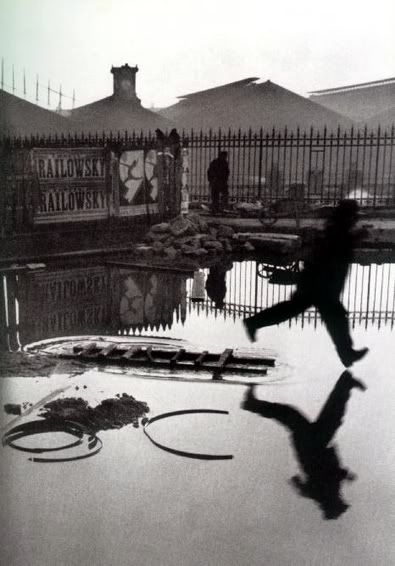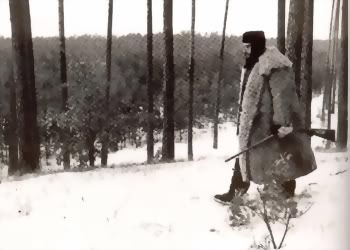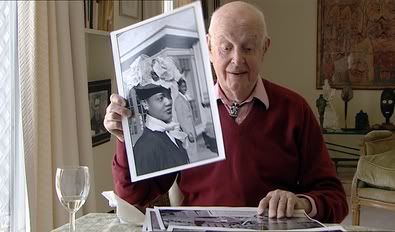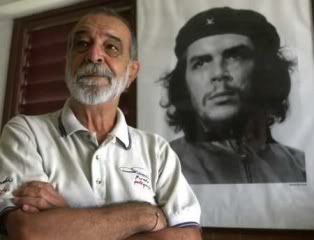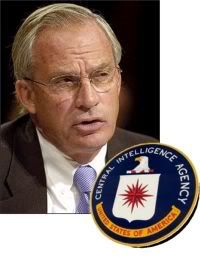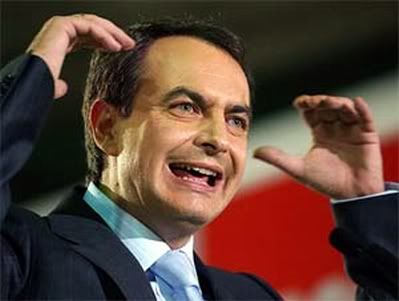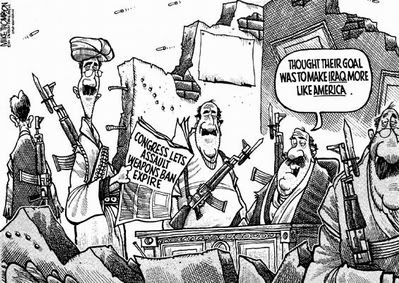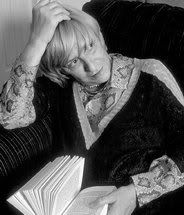 La romancière, malade depuis plusieurs mois, est morte vendredi 24 septembre à l'hôpital d'Honfleur des suites d'une embolie pulmonaire.
La romancière, malade depuis plusieurs mois, est morte vendredi 24 septembre à l'hôpital d'Honfleur des suites d'une embolie pulmonaire.
Sous la frange platine, rappelez-vous le regard, comme il mangeait le triangle du visage ! Au repos, on aurait dit la gravité du chien ; et, soudain, le temps d'un bredouillis, c'était la malice même, sans la méchanceté que l'époque attend des beaux esprits. En quarante ans de gloire, donc de questions idiotes, elle n'a pas dit une sottise ni une perfidie ; même quand on la tannait avec sa légende (voitures, alcool et compagnie), faute de percer son secret. Au fait, quel secret ? Le talent, dans ce qu'il a d'inexplicable, et le culot de s'y abandonner, le courage du premier jet à peine relu, du caprice touche-à-tout, du plaisir qu'on s'invente, de la phrase laissée en plan. Le mystère Sagan ? Tout simplement l'art d'être SOI, sur la page blanche, dans la vie. Un art dont l'exemple va cruellement manquer.
S'appartenir, en 1954, vous n'y pensez pas ! La morale n'étouffait pas les politiques, empêtrés entre deux guerres coloniales, mais les familles, elles, se cramponnaient au code ancien : pas d'amour sans mariage ni enfantement. La pilule restait à inventer. L'avortement était réservé aux grands bourgeois couverts en francs suisses. Les autres étaient réduits à flirter entre deux boogie-woogies. Jouir, le Maréchal était contre ; bientôt le Général aussi. Vaincre la vertu des filles exigeait plus de ruses et de camps de base que l'Annapurna.
Le scandale de Bonjour tristesse ne s'explique pas sans cet environnement maussade. Le roman n'a pas de quoi choquer. Une gamine y décrète son goût de l'alcool et des hommes argentés. La Garçonne faisait pire, et Delly n'est pas loin. Mais c'est un petit bout de lycéenne qui réclame, comme pour elle-même, la nue-propriété de son corps. Auvergnate du 17e arrondissement, Françoise Quoirez n'a pas 19 ans. Et elle n'a pas que les mœurs de délurées. La façon de dire les choses l'est aussi. C'est même elle qui fait le plus sensation. En une phrase, la première du livre, un ton têtu s'impose. Il y est question d'une sensation "énervante et douce", comme celle de l'ongle sur la soie. Pas de doute : il faut avoir fauté pour parler ainsi ; fauté avec la littérature. L'éditeur René Julliard ne s'y trompe pas. Les vieux écrivains enrichis dans l'adultère retors ajustent leurs bésicles : hé, hé ! si un petit diable nous était né ?
Une vocation bien classique, au contraire. Comme à peu près toute la génération tombée pubère après la Libération, Sagan a pressenti la joie de s'appartenir, à 13 ans, dans les hymnes symbolards des Nourritures terrestres. Juste après Gide vint Camus. L'ancienne pensionnaire des Oiseaux venait de perdre la foi. C'était à Lourdes, devant le brancard d'une petite infirme à vie. Un Dieu qui permettait cela n'avait pas droit à ses oraisons. L'Homme révolté allait remplir le vide du ciel de son humanisme sympa. Enfin, ce fut Rimbaud, dévoré sous une tente à rayures, vers Hendaye, tôt le matin. Dès lors, les livres seraient tout pour elle, et les écrivains, même poussifs, seraient sauvés à ses yeux par la folie qu'il y a à se jeter dans la fournaise des mots, afin d'éteindre on ne sait quel incendie...
Donc, Bonjour tristesse fait l'effet d'une danse nue dans le dortoir des grandes. La presse à ragots ne quitte pas l'auteur d'une semelle. Cette manière de claquer ses droits d'auteur en voitures de sport, en nuits chez Régine et en escapades à Saint-Tropez, c'est exactement ce qu'il faut pour exciter le mélange dont vit cette presse, de fascination et d'opprobre.
La vitesse sur route passe encore pour un plaisir rare, étant peu partagé. Après Morand, Nimier et Sagan en font le signe d'une familiarité prestigieuse avec la mort. Qui ne pratique pas le vertige des dérapages contrôlés est suspect d'aimer la vie en bourgeois, c'est-à-dire mal, de ne pas savoir aimer. Un romantisme suicidaire réunit les plus doués de ces "enfants tristes". En temps de guerre froide, le choix est entre ce désenchantement trépidant et l'overdose politique, guère plus maligne.
Pour Sagan, le jeu s'apparente à la vitesse. On ne prend pas goût aux casinos, on naît mordu ou pas. Au bord d'un tapis vert ou d'une pelouse, le gain compte moins que la sensation, si la main est heureuse, d'être chéri des dieux. Rien ne ressemble au talent comme la chance, qui n'est elle-même qu'une forme supérieure du culot.
On sait comment Sagan est devenue propriétaire de sa maison d'Equemauville, au-dessus de Honfleur. Elle l'avait d'abord louée, par dépit que la classe moyenne d'Europe du Nord ait envahi et défiguré Saint-Tropez. Le matin où elle devait en rendre les clés, elle remontait de Deauville avec une différence positive de 80 000 francs. Tout à trac, le propriétaire lui offrit les lieux, pour cette somme précise. Certaines coïncidences ressemblent si fort à des signes du ciel que d'y résister tiendrait de la bouderie.
Corollaire de ce code d'élégance envers la veine : la poisse, elle aussi, serait méritée. La narratrice de Bonjour tristesse trouve "bien fait", comme disent les enfants, que sa rivale bronze mal. Dans Château en Suède, les châtelains moqueront assez cruellement le bel intrus d'ignorer les règles de la tribu. La joie d'être soi inclut celle d'être entre-moi, en bande, à l'abri des habitudes, des plaisanteries et des rengaines dont se fortifie l'amitié. Les mots "rosse" et "féroce" font partie du vocabulaire saganien, étant clair qu'ils ne tirent pas à conséquence.
J'ai personnellement constaté ce penchant clanique pour le bizutage. Nouveau venu à Equemauville, je faillis être pris pour tête de Turc par l'hôtesse et ses habitués. Le hasard, qui était là-bas chez lui, fit surgir un chanteur du genre chic type rasoir pour feu de camp. C'est lui qui fut la risée.
La scène se passait vers 1960. Le mythe Sagan battait son plein. Une Aston Martin l'entretenait, de ses feulements. Au moindre fléchissement de l'actualité, les magazines revenaient à la romancière fêtarde aux pieds nus, à ses bolides et ses gueules de bois. Sagan saluait d'un pouffement les curiosités vraiment trop nulles, mais elle répondait. Et ses avis sur l'époque, comme sur elle-même, sonnaient toujours juste, parce que sans triche. Cette vie de noctambule, ces romans un peu bâclés, allait-elle s'en contenter longtemps encore ? On verrait bien.
"Bâclés", les livres ? Mieux vaudrait dire "jetés", et insolemment gracieux d'obéir au premier mouvement. Les femmes y sont merveilleusement ceci, excessivement cela, les hommes ont des mains rassurantes de commandants de bord à la KLM, les glaçons tintent dans les verres, les jeunes gens paient en moqueries l'avantage agaçant de leur peau trop lisse, etc., bref, le lieu commun coule avec la prodigalité du whisky, et quelque chose dit au lecteur qu'une fille astucieuse et cultivée comme elle se montre dans les interviews, lectrice de Proust et de Virginia Woolf, pourrait peut-être s'appliquer un peu plus dans ses livres.
Mais non : la seule notion d'effort lui va comme une 2 CV en côte. Son charme veut la désinvolture de l'esquisse. Le culte de l'instant réussi ne se divise pas. Et on aurait tort de croire qu'il vieillit mal. Relisez Un certain sourire, Dans un mois dans un an, Aimez-vous Brahms..., Les Merveilleux Nuages, La Chamade, Des bleus à l'âme : on oublie la futilité du milieu jet-set, toujours le même, un peu comme on oublie les princesses de Racine et les duchesses de Proust, pour ne retenir que le je-ne-sais-quoi d'une notation, un assemblage d'odeurs ou d'adjectifs, qui font que les sensations de l'auteur deviennent les nôtres. N'est-ce pas cela, la littérature ?
Le théâtre aussi bien. Un talent tellement joueur, et à partir de petits riens, ne pouvait qu'être attiré par la scène. Sagan en était à son troisième roman. Elle publia des bribes de dialogues dans une revue. Barsacq les lut. Ce fut Château en Suède, à l'Atelier, en 1959. Claude Rich était le frère complice, personnage-clé de la mythologie saganienne, et Philippe Noiret le mari tonitruant et débonnaire, autre figure de la famille. Les répliques gagées sur un solide sens du farniente faisaient écho à la petite musique des romans, cette musique à laquelle se raccrochent les critiques en peine d'expliquer pourquoi un auteur sait se faire écouter, et dont on parlait déjà à propos d'un certain Musset.
Parfois, le succès ne fut pas au rendez-vous. On a beau y penser très fort, le bon numéro ne sort pas forcément. Sagan prenait les échecs d'auteur dramatique comme les revers de casino, avec respect pour les caprices de la banque et du ciel. Il faut bien perdre un peu, pour mieux savourer la gagne du lendemain. Qui ne l'a pas vue "récupérer" en quelques quarts d'heure les pertes de toute une nuit ne peut comprendre comme c'est joyeux de narguer le sort.
Le risque l'attirait plus que tout. Et qu'il fût partagé par une équipe d'amis renforçait son excitation. Le don de soi et la folie des comédiens avaient tout pour la séduire. Peu d'écrivains ont peint avec autant d'estime attendrie cette autre pièce maîtresse du petit monde saganien qu'est l'actrice mûrissante : Marie Bell, Juliette Gréco (dans Bonheur impair et passe), Danielle Darrieux (dans La Robe mauve de Valentine). C'est encore d'une théâtreuse qu'elle fera le portrait dans un de ses derniers romans, Le Miroir égaré (Plon, 1996).
Avec les années 1980, qui étaient aussi, pour elle, celles de la cinquantaine, Sagan a voulu, dirait-on, donner tort à ceux qui la croyaient enfermée dans un milieu, une époque, et une distance courte. Des romans un peu plus longs se sont succédé (La Femme fardée), sur fond d'années 1940 (De guerre lasse). Mais elle ne pouvait empêcher que l'attention s'attache à ce qu'elle savait le mieux faire, une couleur d'aube, une subtilité de perception, un dégradé de sentiment, toujours une "espèce de" ceci ou de cela. Il existe une grande tradition de moralistes français pour qui écrire consiste à redéfinir les paysages, et d'abord ceux de l'âme, à partir d'infimes nuances chantantes. Sagan va s'y inscrire peu à peu, avec plus de force que ne le suggérait, à chaque essai nouveau, sa confondante facilité.
Poussé parfois jusqu'au défi, son art d'être soi ne lui a pas valu que des gracieusetés. Les moraleux, à ne pas confondre avec les moralistes, commencèrent à froncer le sourcil quand la petite prodige de Bonjour tristesse passa l'âge des grosses bêtises. L'accident routier de 1957 fut durement commenté. Plus encore, en octobre 1985, un certain rapatriement de Colombie par les soins de l'Elysée. Les "anti" ne savaient pas au juste ce qui les hérissait le plus, que la romancière passe pour s'adonner à quelque drogue, ou qu'elle s'affiche pour Mitterrand. Les mêmes lecteurs (lectrices) qui avaient puisé dans ses premiers romans des leçons d'émancipation sans trop de conséquences lui en voulaient d'avoir rejoint résolument l'ennemi en choisissant la gauche et son champion. Ses opinions et sa façon de ne pas en démordre alors que les intellectuels ne s'étaient jamais autant reniés lui auront été comptées plus qu'à aucun autre artiste par la presse modérée, qui, quoi qu'on prétende, a toujours dominé le marché du goût.
Le mini-lynchage consécutif à son engagement et à certains démêlés judiciaires n'était pas sans rappeler celui que subit, depuis sa mort, Jean-Paul Sartre, accusé d'avoir terrorisé les lettres durant trente ans, quand il ne fit, fort d'une revue confidentielle, que régner par le talent et la générosité de ses questionnements.
Il est assez symbolique que Sagan ait égayé les derniers mois de la vie de Sartre. Trente années les séparaient, mais ils étaient jumeaux Gémeaux, tous deux nés un 21 juin. L'un avait labouré le concept, l'autre froissé de la soie. L'ancienne pilote de Jaguar passait prendre le philosophe aveugle dans sa mini-Austin cabossée. Ensemble, ils dînaient et blaguaient. Elle s'était crue frivole jusqu'à l'apolitisme ; lui se demandait s'il n'aurait pas dû l'être davantage. Il fallait les voir, gais comme des collégiens ayant fait une bonne niche à Dieu sait qui.
Avec tout le sérieux qu'elle savait mettre dans les rites amicaux, Sagan a raconté (Avec mon meilleur souvenir) cette connivence de deux monstres sacrés du XXe siècle, aussi peu vaniteux que possible, simplement réjouis devant leurs respectifs empires de papier, de mots dansants.
Les voilà ensemble, et si peu eux-mêmes, puisque muets. La barbe !
Bertrand Poirot-Delpech / LE MONDE






